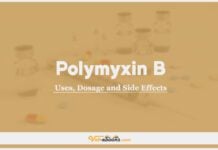Tylosin In Dogs & Cats: Uses, Dosage and Side Effects

Overview
- A time-dependent macrolide antibiotic that binds to the 50S ribosomal subunit, suppressing bacterial protein synthesis.
Uses of Tylosin
- Tylosin exhibits strong activity against mycoplasmas and shares a similar antibacterial spectrum with erythromycin.
- However, it is generally less effective against bacteria compared to erythromycin.
- While seldom prescribed in small animal medicine, it has been utilized for treating antibiotic-responsive diarrhoea in dogs and for cryptosporidiosis.
- Administration in dogs and cats is mainly done orally.
Dose of Tylosin in Dogs and Cats
Dogs:
- Various doses: 7–15 mg/kg p.o. q12–24h.
- In colitis, higher doses are recommended 12–20 mg/kg q8h with food gradually increasing the dosing interval to q24h.
Cats:
- 7–15 mg/kg p.o. q12–24h.
Drug Dosage Calculator
You Should Give:
Side Effects of Tylosin in Dogs and Cats
- Tylosin can lead to gastrointestinal disturbances.
- Its effectiveness is increased in an alkaline pH environment.
- Injection of tylosin may cause pain at the injection site.
Contraindications of Tylosin in Dogs and Cats
- No information is available.
Some Notes:
- Not well documented in small animals.
- It does not appear to inhibit the same hepatic enzymes as erythromycin.
Tip
Do You Want To Increase Your Veterinary Knowledge and Practical Skills?
You Can Now Browse and Download +3000 Books For Veterinary Professionals & Students Online.
Download Veterinary Books




















